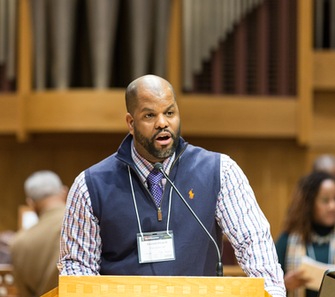The Role of a Peer Learning Group in My Preaching Journey
God’s message of inclusiveness reaches past the walls that divide us, says Deborah Jungmi Kang, a Korean pastor serving a largely Anglo-American church in Illinois. As Kang develops her preaching voice, a peer learning group provides support.
What I Learned through Preaching Partnerships
Fred Provencher has participated in two preaching peer groups in his twenty-plus years of ministry. Read his reflections along with his advice for younger preachers.
So You've Been Asked to ... Lead in Prayer (現在你被邀請...帶領祈禱)
A resource in leading public prayer in worship
Emmett G. Price III on Racial Reconciliation Resources for Congregations
Learning about diversity among Christians is a good way to embrace the ministry of reconciliation entrusted to us by God.
Emmett G. Price III on Studying Black Christian Experience
“If we don’t see each other in the Bible, we get stuck in social perplexities that cause us to not be a good witness,” says Emmett G. Price III.
Ernest Brooks on Inspiring Young People to Become Preachers
The Academy of Preachers identifies promising young preachers from all Christian backgrounds and brings them together to explore and develop their preaching gifts.
Yes, And . . .
Experiencing pastoral burnout, Denise Luper began a yearlong leave of absence soon after joining a peer preaching and learning group. The peer group became an important part of her healing process.
A Community That Affirms
A peer preaching group changed the course of a student’s seminary journey—and her ministry path.
Three Reasons to Join a Preaching Peer Group
Sermon preparation is a recurring task that can be lonely and draining. A Texas pastor describes how a peer learning group revitalized her preaching.
Considering a Preaching Peer Group? Five Things to Think About
A seasoned pastor found a preaching peer group to be a source of refreshment, challenge, and growth. Here are his top five reasons.
New Program Equips Students for Leadership in the Church
The Calvin Institute of Christian Worship announces the establishment of the Ministry Leadership Cohort—a two-year program available to incoming Calvin students who show potential for leadership in the local church. The initiative, open to students interested in any major or field of study, is available beginning with the 2019 incoming class.
Improving Preaching through Mutual Reflection
Newly trained as a homiletic peer coach, a veteran pastor builds on the experiences that had the greatest impact on his formation as a preacher: mutual reflection with colleagues.











